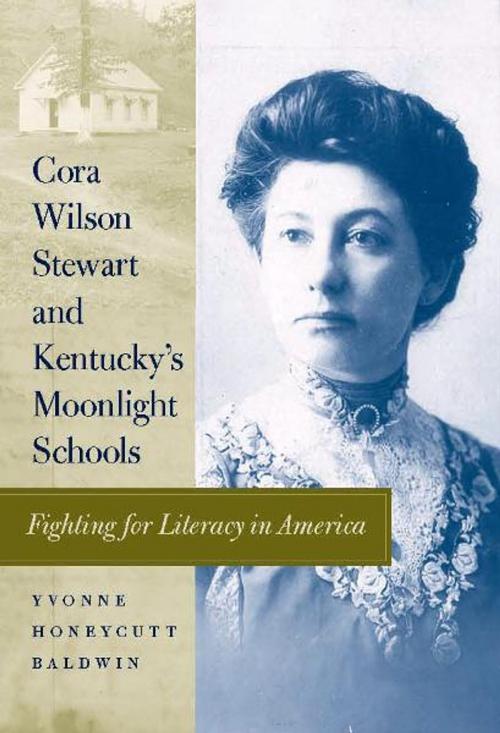Cora Wilson Stewart and Kentucky's Moonlight Schools
Fighting for Literacy in America
Nonfiction, Reference & Language, Education & Teaching, History, Biography & Memoir, Reference| Author: | Yvonne Honeycutt Baldwin | ISBN: | 9780813138329 |
| Publisher: | The University Press of Kentucky | Publication: | March 3, 2006 |
| Imprint: | The University Press of Kentucky | Language: | English |
| Author: | Yvonne Honeycutt Baldwin |
| ISBN: | 9780813138329 |
| Publisher: | The University Press of Kentucky |
| Publication: | March 3, 2006 |
| Imprint: | The University Press of Kentucky |
| Language: | English |
The first woman elected superintendent of schools in Rowan County, Kentucky, Cora Wilson Stewart (1875--1958) realized that a major key to overcoming the illiteracy that plagued her community was to educate adult illiterates. To combat this problem, Stewart opened up her schools to adults during moonlit evenings in the winter of 1911. The result was the creation of the Moonlight Schools, a grassroots movement dedicated to eliminating illiteracy in one generation. Following Stewart's lead, educators across the nation began to develop similar literacy programs; within a few years, Moonlight Schools had emerged in Minnesota, South Carolina, and other states. Cora Wilson Stewart and Kentucky's Moonlight Schools examines these institutions and analyzes Stewart's role in shaping education at the state and national levels. To improve their literacy, Moonlight students learned first to write their names and then advanced to practical lessons about everyday life. Stewart wrote reading primers for classroom use, designing them for rural people, soldiers, Native Americans, prisoners, and mothers. Each set of readers focused on the knowledge that individuals in the target group needed to acquire to be better citizens within their community. The reading lessons also emphasized the importance of patriotism, civic responsibility, Christian morality, heath, and social progress. Yvonne Honeycutt Baldwin explores the "elusive line between myth and reality" that existed in the rhetoric Stewart employed in order to accomplish her crusade. As did many educators engaged in benevolent work during the Progressive Era, Stewart sometimes romanticized the plight of her pupils and overstated her successes. As she traveled to lecture about the program in other states interested in addressing the problem of illiteracy, she often reported that the Moonlight Schools took one mountain community in Kentucky "from moonshine and bullets to lemonade and Bibles." All rhetoric aside, the inclusive Moonlight Schools ultimately taught thousands of Americans in many under-served communities across the nation how to read and write. Despite the many successes of her programs, when Stewart retired in 1932, the crusade against adult illiteracy had yet to be won. Cora Wilson Stewart presents the story of a true pioneer in adult literacy and an outspoken advocate of women's political and professional participation and leadership. Her methods continue to influence literacy programs and adult education policy and practice.
The first woman elected superintendent of schools in Rowan County, Kentucky, Cora Wilson Stewart (1875--1958) realized that a major key to overcoming the illiteracy that plagued her community was to educate adult illiterates. To combat this problem, Stewart opened up her schools to adults during moonlit evenings in the winter of 1911. The result was the creation of the Moonlight Schools, a grassroots movement dedicated to eliminating illiteracy in one generation. Following Stewart's lead, educators across the nation began to develop similar literacy programs; within a few years, Moonlight Schools had emerged in Minnesota, South Carolina, and other states. Cora Wilson Stewart and Kentucky's Moonlight Schools examines these institutions and analyzes Stewart's role in shaping education at the state and national levels. To improve their literacy, Moonlight students learned first to write their names and then advanced to practical lessons about everyday life. Stewart wrote reading primers for classroom use, designing them for rural people, soldiers, Native Americans, prisoners, and mothers. Each set of readers focused on the knowledge that individuals in the target group needed to acquire to be better citizens within their community. The reading lessons also emphasized the importance of patriotism, civic responsibility, Christian morality, heath, and social progress. Yvonne Honeycutt Baldwin explores the "elusive line between myth and reality" that existed in the rhetoric Stewart employed in order to accomplish her crusade. As did many educators engaged in benevolent work during the Progressive Era, Stewart sometimes romanticized the plight of her pupils and overstated her successes. As she traveled to lecture about the program in other states interested in addressing the problem of illiteracy, she often reported that the Moonlight Schools took one mountain community in Kentucky "from moonshine and bullets to lemonade and Bibles." All rhetoric aside, the inclusive Moonlight Schools ultimately taught thousands of Americans in many under-served communities across the nation how to read and write. Despite the many successes of her programs, when Stewart retired in 1932, the crusade against adult illiteracy had yet to be won. Cora Wilson Stewart presents the story of a true pioneer in adult literacy and an outspoken advocate of women's political and professional participation and leadership. Her methods continue to influence literacy programs and adult education policy and practice.















